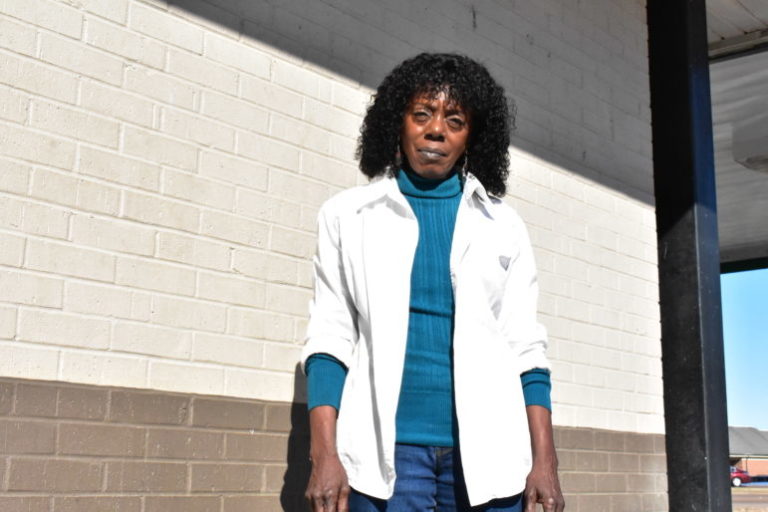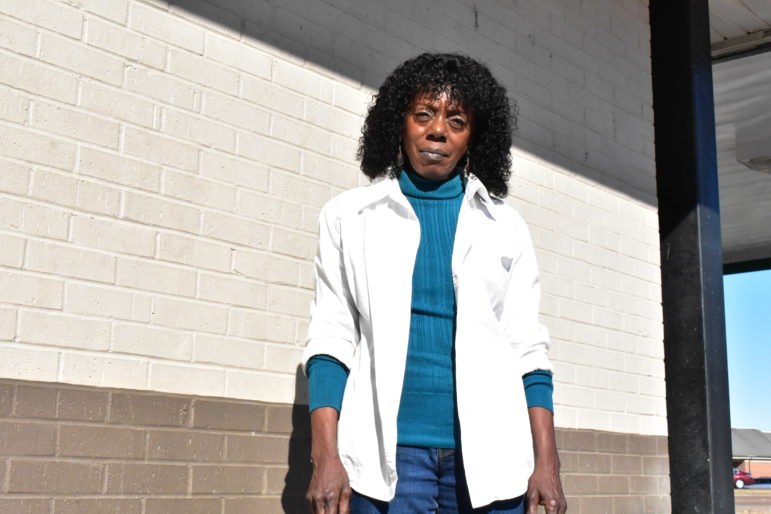

Aallyah Wright, Mississippi Today
Minerva Clemon, 70, lives on the outskirts of Schlater, where she has been without running water since July.
SCHLATER — In November, reports of Minerva Clemon’s struggle to get safe drinking water awakened Mississippians to a water crisis that many communities around the state share: the lack of access to clean, running water.
“At this time in life, I’m too old to be trying to repair a pump every six months and I feel like we should be entitled to water like everyone else,” the 70-year-old Schlater resident told Mississippi Today in November.
Once news coverage of the families’ plight spread, government officials — local, state, and federal — worked in tandem to fix the problem, and families can finally get what they’ve been waiting nearly a year for: a new water well system.
Late last week, the Mississippi Department of Human Services announced receipt of a $63,000 grant from the U.S. Department of Health and Human Services to build a new well.
“It’s hard to imagine communities being without basic necessities, especially during the (coronavirus) pandemic we’re facing,” said Robert G. “Bob” Anderson, executive director of the state Department of Human Services in the release. “Hygiene is critical for the health and welfare of everyone right now.”
Mississippi Today reached out to Clemon after the news of well funding was released. What was once Clemon’s biggest concern — funding — is now trumped by a new obstacle: an ownership issue with the land. Clemon’s home is considered heirs’ property, or property passed down without a will.
“The problem is the land needs to be in my name,” Clemon told Mississippi Today. “The property was my grandfather’s and went to my mother. Basically, all of her siblings are gone and all of their children have a piece in this land. Black people don’t do wills and end up with heirs’ property.”
Joyce Chiles, of Mississippi Delta-based Chiles Law Firm PLLC, said to move the process forward on a case like this, the court would need to partition the land. This means notifying all parties who may be property owners.
“Let’s assume you have five siblings and your parents leave without doing a will. According to the law of intestate and distribution, each sibling will take an equal share but will own the whole thing together,” Chiles said. “The property has not been divided. It means you and your siblings own the home. No one person owns one particular portion.”
So far, 17 states have passed the Uniform Partition of Heirs Property Act, which “helps preserve family wealth in the form of real property.” Mississippi is one of the states that has not passed this legislation. However, Senate Bill 2553, which would establish procedures to partition heirs’ property, was passed by the Senate in the 2020 legislative session before it recessed due to the coronavirus pandemic.
Schlater residents have been living without clean, running water since July as a result of broken water well pumps. After Mississippi Today’s initial report, Brandon Presley, Mississippi Public Service Commissioner for the Northern District, called to inquire about how his office could be of help.
He conducted follow-up discussions with federal and local water agencies and local lawmakers to see what could be done to assist the families and established a two-phase plan.
Central Mississippi, Inc., a community action agency in Leflore County along with the Greenwood Fire Department provided thousands of gallons of water by a water tank and bottled water to residents, said Pam Gary, director of Central Mississippi. They also went to the state Department of Human Services to apply for the grant.
The cost of the water pump is between $45,000 and $50,000. The rest of the funds will be used to make residents “more sustainable in the future,” by assisting with utility bills, rent and mortgage, Gary said.
“I’m just glad we were able to get this (grant),” Gary said. “… I’ll feel better once the property rights are resolved, get the grant completed and running water in homes.”
This effort in Leflore County served as a catalyst to spearhead similar efforts in other rural communities across the state, Presley said. In Tishomingo County, for instance, three families have been without water, but the Northeast Mississippi Community Action Agency, in conjunction with Presley’s office and other officials were able to solidify nearly $6,000 for those residents.
“We had folks who were 70-plus-years-old toting water (to their homes),” Presley told Mississippi Today in a phone call. “I think this is a great example of where the press highlighted this need and state government, federal government, local government, and nonprofits responded.”
Nailing down which communities are without water remains a challenge, but Presley said his office is working with the Mississippi Rural Water Association to do so. The PSC created an ongoing database to ask residents if they’re lacking water.
“We’re taking the playbook we used in this Leflore County case to meet a need more widespread. This particular case has given us the opportunity to put everyone in the room,” Presley added. “That is exactly what we did in Tishomingo County with your reporting, in a very short period.”
With the coronavirus still spreading across the county and throughout the state, construction and completion dates for the water well projects are up in the air. In spite of continuous roadblocks to get basic necessities like water, rural Mississippians like Clemon remain hopeful.
“Right now, I’m still saying my prayers and waiting because at this point it’s a waiting game to see,” Clemon said.
The post Delta families without running water get funding, but new well construction stalls over property issues appeared first on Mississippi Today.
- NAACP threatens to sue Elon Musk’s xAI over pollution in Mississippi - February 13, 2026
- School consolidation bill dies without a vote in Mississippi Senate - February 13, 2026
- In a village courtroom, a fervent prayer was answered for Ole Miss QB Trinidad Chambliss. But it took quite a while - February 13, 2026